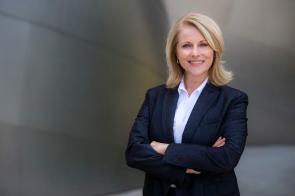
I advised the candidate to try to negotiate with her firm the ability to at least remain on the website and she did, and they agreed to keep her on the website for a three month period. I also advised her to offer 2-3 references in an affirmative manner; we named and provided their contact information in the cover letter to each firm to which we applied. We took a two-prong approach: we applied to firms with IP litigation position openings, and we also applied to those with commercial litigation openings. We also proactively reached out to every other firm with a litigation practice, making the case that the highly specialized litigation skills the candidate had cultivated within the IP space enabled her to learn new clients and new industries, as with each new patent in dispute, she had to do well enough to decode the "product" patent. I highlighted the purely litigation skills she had gained and how transferable those were to a general commercial litigation practice, such as drafting a complaint for ACLU of DE case, a mediation statement for ride-sharing client, motions, portions of collaborative briefs, Veteran's appeal to the United States Court of Appeals for Veterans Claims, and memos for various patent and civil rights cases; managing an exhibit list for a multimillion-dollar stock purchase litigation between two international pharmaceutical companies; drafting an oral argument outline for and aided in oral argument preparation for same; drafting subpoena objections, document review, and production for antitrust pharmaceutical litigation; participating as second chair in mediation and settlement efforts for ride-sharing client; and drafting invalidity charts for litigation involving infringement of semiconductors.
A few firms showed interested and requested interviews. Also, separately, the candidate had applied to one large firm on her own and that firm was interested in interviewing with her as well. That firm interview process was a long one, as she went through three long rounds of multiple interviews. She kept saying she was prioritizing that firm and that the firm was very excited about her. At the same time, we prepared for our firm interviews and those appeared to go well for the candidate, too. I kept the firms informed that was progressing with other firms and this information seemed to spur a couple into taking quicker action. We ended up receiving one offer, but the compensation was a much lower compensation than the candidate had been making, what she was expecting, and what she also expected to receive from the larger, more full-service firm with which she had completed three rounds. After receiving only positive communications from that larger firm, the firm let my candidate know they would not actually be making her an offer at this time. Thankfully, my smaller firm had waited patiently and was not turned off by the fact that the candidate was looking at and talking to other firms. We set up a couple additional meetings at the firm for her to be able to evaluate the possibilities further, and she accepted a position with the firm.
She transitioned her practice to a commercial litigation one. The candidate took a substantial pay cut - she is making less than half of what she was making at her previous firm. But, her reasoning for doing so was that it would be worth it in the long-term, as there would be many more commercial litigation opportunities in the future than in IP litigation, and she also genuinely really wanted a commercial litigation practice.
About Harrison Barnes
Harrison Barnes is a prominent figure in the legal placement industry, known for his expertise in attorney placements and his extensive knowledge of the legal profession.
With over 25 years of experience, he has established himself as a leading voice in the field and has helped thousands of lawyers and law students find their ideal career paths.
Barnes is a former federal law clerk and associate at Quinn Emanuel and a graduate of the University of Chicago College and the University of Virginia Law School. He was a Rhodes Scholar Finalist at the University of Chicago and a member of the University of Virginia Law Review. Early in his legal career, he enrolled in Stanford Business School but dropped out because he missed legal recruiting too much.
Barnes' approach to the legal industry is rooted in his commitment to helping lawyers achieve their full potential. He believes that the key to success in the legal profession is to be proactive, persistent, and disciplined in one's approach to work and life. He encourages lawyers to take ownership of their careers and to focus on developing their skills and expertise in a way that aligns with their passions and interests.
One of how Barnes provides support to lawyers is through his writing. On his blog, HarrisonBarnes.com, and BCGSearch.com, he regularly shares his insights and advice on a range of topics related to the legal profession. Through his writing, he aims to empower lawyers to control their careers and make informed decisions about their professional development.
One of Barnes's fundamental philosophies in his writing is the importance of networking. He believes that networking is a critical component of career success and that it is essential for lawyers to establish relationships with others in their field. He encourages lawyers to attend events, join organizations, and connect with others in the legal community to build their professional networks.
Another central theme in Barnes' writing is the importance of personal and professional development. He believes that lawyers should continuously strive to improve themselves and develop their skills to succeed in their careers. He encourages lawyers to pursue ongoing education and training actively, read widely, and seek new opportunities for growth and development.
In addition to his work in the legal industry, Barnes is also a fitness and lifestyle enthusiast. He sees fitness and wellness as integral to his personal and professional development and encourages others to adopt a similar mindset. He starts his day at 4:00 am and dedicates several daily hours to running, weightlifting, and pursuing spiritual disciplines.
Finally, Barnes is a strong advocate for community service and giving back. He volunteers for the University of Chicago, where he is the former area chair of Los Angeles for the University of Chicago Admissions Office. He also serves as the President of the Young Presidents Organization's Century City Los Angeles Chapter, where he works to support and connect young business leaders.
In conclusion, Harrison Barnes is a visionary legal industry leader committed to helping lawyers achieve their full potential. Through his work at BCG Attorney Search, writing, and community involvement, he empowers lawyers to take control of their careers, develop their skills continuously, and lead fulfilling and successful lives. His philosophy of being proactive, persistent, and disciplined, combined with his focus on personal and professional development, makes him a valuable resource for anyone looking to succeed in the legal profession.
About BCG Attorney Search
BCG Attorney Search matches attorneys and law firms with unparalleled expertise and drive, while achieving results. Known globally for its success in locating and placing attorneys in law firms of all sizes, BCG Attorney Search has placed thousands of attorneys in law firms in thousands of different law firms around the country. Unlike other legal placement firms, BCG Attorney Search brings massive resources of over 150 employees to its placement efforts locating positions and opportunities its competitors simply cannot. Every legal recruiter at BCG Attorney Search is a former successful attorney who attended a top law school, worked in top law firms and brought massive drive and commitment to their work. BCG Attorney Search legal recruiters take your legal career seriously and understand attorneys. For more information, please visit www.BCGSearch.com.





